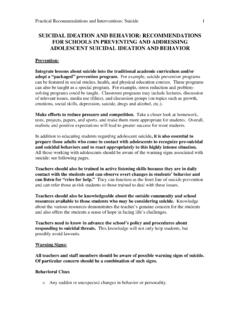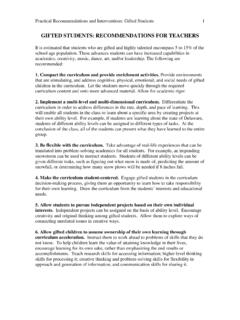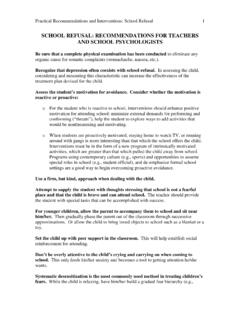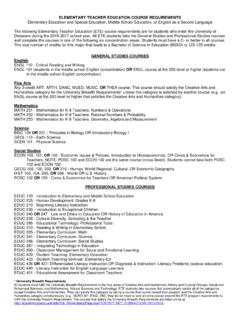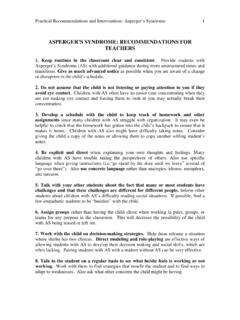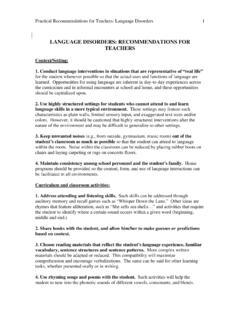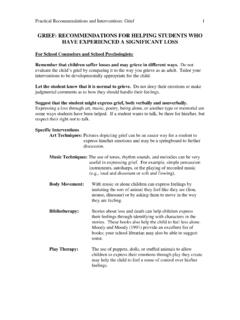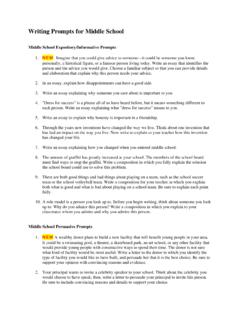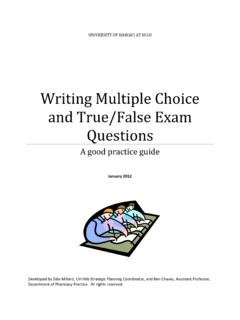Transcription of Oppositional Defiant Disorder - School of Education
1 Oppositional Defiant Disorder : RECOMMENDATIONS. FOR TEACHERS AND FOR PARENTS. Understand that Oppositional Defiant Disorder (ODD) is a consistent pattern of Defiant , disobedient, and aggressive behavior towards authority that persists for at least 6 months. Types of behaviors include: defiance of authority, arguing, losing control of temper, refusal to follow rules, deliberately bothering people, placing blame on others for one's own actions, being easily bothered, and maniacal behavior. Instead of just mentioning classroom rules and regulations, teach them how to apply the rule to their actions.
2 This avoids the issue of kids attempting to find loopholes in your classroom rules. Integrate this into your lessons. Oppositional Defiant students like to be in control of a situation, therefore, where appropriate, instead of providing them with directives, ask them questions. Instead of saying you need to get your work done before you can leave detention, ask the child what do you need to get done before you can leave detention? . Turn arguments into discussions. Do not give in or lower yourself to your child's level and argue incessantly back.
3 Give the child explicit choices and agree to hear the child out and entertain his or her ideas and desires. Give Choices. When they are complaining about the amount of work in spelling, give them the choice of they can do their work now or they can't go to gym or do some other desirable activity. This helps give them autonomy or self-control. Independence is necessary for adolescents as it leads to increased responsibility. Allow for some choice of independence from your teen, as well as offer them some more structured independent tasks requiring responsibility.
4 Include child in family and household obligations by giving them specific chores that are their responsibility and will not get done unless the child does them. When appropriate, ignore the student's disruptive behavior. If the function of the behavior is to gain attention by either interrupting consistently or making noise, ignore the behavior. Before using this tactic, make sure that the class knows that misbehavior will not always be addressed immediately, but it will be taken care of. If the class is not addressed, they will feel that the disruptive student is getting away with misbehaving.
5 When a student consistently asks questions in an attempt to distract you from the lesson, tell them that you will answer their question at a later time, during their time.. This will make evident which students really need the help and which ones were just trying to distract. When a student mentions how another teacher didn't punish him or her for a behavior, re-focus on the present instruction. For example, say you think that just because someone else let you get away with the behavior, it doesn't apply in here, but it does.. Avoid intimidation.
6 With ODD students, intimidation increases their non-compliant behavior. Avoid public reprimands. Always try to address behavior privately, especially with adolescents. In order for them to be effective, any rewards or punishments must be meaningful and salient to the child Purposefully set aside and spend positive time with the child. Positive and supportive teacher-parent and parent-child relations are critical. Praise and acknowledge your child's positive behavior or even the lack of their negative behavior that you are accustomed to. Point out positive characteristics.
7 Emphasize, when feasible, self-management techniques instead of external control. Use time-out as a last resort. It often increases Defiant behavior. When used, remain calm and firm. Use time-outs effectively with elementary and early adolescents. Designate the specific chair, room, or area where the child will go for a time-out. Do not make empty threats. Properly follow through, starting the time-out only when the child is calm and quiet. For adolescents, sending them to their room for a designated amount of time will be more effective than giving them a time-out.
8 Avoid quick changes in normal routine. Post schedules in the classroom or on the student's desk. This empowers the child. For younger children, a picture schedule may be most effective. Cue students into how much time they have left on assignments. Make sure to give them plenty of notice. This provides students with more control. When you give a certain length of time to finish a task, keep time limits short because Defiant students will push the limit. Provide a high level of structure to classroom work. ODD students have trouble with organization.
9 An example of a structure intervention would be having the students' desk belongings placed in boxes and arranged according to activity. This decreases the chance that the child will be overwhelmed with work. Avoid tasks that are beyond the student's ability. Keeping tasks in their given ability level, allows them to still maintain control. Avoid signs of disapproval towards the child. This once again makes the child feel like they need to regain control again, causing them to misbehave. If and when the child shuts down and refuses to talk, stay calm and state your feelings and point of view, and then walk away from the potential fight.
10 The child will hear you whether or not they appear to be listening. State the consequences that will come from this behavior until the child is ready to talk. Consequences should be straightforward and easy to understand as well as agreed upon by all parties involved. Consistent rules and consequences must be followed by all who are implementing them. Hold a firm and consistent stand on consequences of violations of School policies, laws, and social norms. Enforce limits but express unconditional love. Choose your battles. Accept a lack of control in certain areas such as clothing, friends, music, and cleaning the bedroom, where arguments might arise and violations of rules and regulations are minor and not worth an argument.

